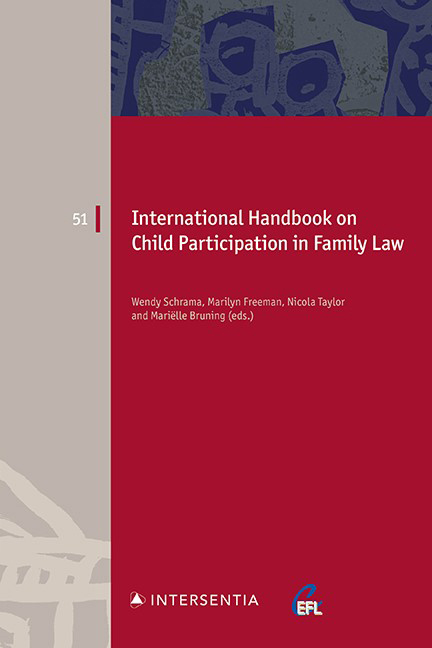Book contents
The Hague Conventions and EU Instruments in Private International Law
Published online by Cambridge University Press: 10 December 2021
Summary
INTRODUCTION
In this chapter, we will explain the role of private international law instruments in seeking to ensure children's right to participation.
Private international law instruments most often do not impose direct duties to hear the child or do not address the opportunity or the methods for child participation in judicial proceedings. This branch of law addresses four issues: which court has jurisdiction to hear disputes linked to two or more legal systems, what the applicable law is, what the conditions for the recognition and enforcement of foreign judgments are, and how authorities can cooperate across borders to solve disputes between individuals. In other words, private international law comprises road signs pointing the way to the legal system within which a certain case should be settled, not detailed traffic rules. Therefore, how children should participate in proceedings is generally a matter for national procedural law.
The fundamental rights of the child must be respected in all actions concerning the child, transnational cases included. This includes children's right to participate in all proceedings concerning them. In this context, the borders between private international law and human rights law are slowly fading, in the sense that the second influences the functioning of the first.
Supranational legislators of private international law are not blind to the importance of child participation, especially when their instruments have as a fundamental objective the protection of the best interests of the child. As will become apparent in this chapter, legislation on private international law more and more frequently makes explicit reference to the protection of the fundamental rights of the child as a primary concern and (at the same time) as a principle inspiring the interpretation and application of its rules.
In this chapter we identify indirect duties and careful nudges by supranational legislators to better respect children's right to participation. This includes explaining the role of private international law instruments like the 1980 Hague Convention on the Civil Aspects of International Child Abduction, the 1996 Hague Child Protection Convention, the Brussels II bis and ter Regulations and maintenance conventions and Regulation.
CHILD PROTECTION
1980 HAGUE CONVENTION ON THE CIVIL ASPECTS OF INTERNATIONAL CHILD ABDUCTION
One of the areas in which the issue of child participation has emerged is international child abduction, a phenomenon that has become one of the most important concerns for public institutions since the second half of the 20th century.
- Type
- Chapter
- Information
- Publisher: IntersentiaPrint publication year: 2021



